Nutrition
Nutrition is the process by which living organisms obtain and utilize food for growth, maintenance, and repair of their bodies. It involves the intake of food, digestion, absorption, and metabolism of nutrients within the body.
Key Concepts in Nutrition
- Macronutrients: These are the nutrients required in large amounts by the body, including carbohydrates, proteins, and fats. They provide energy and support various bodily functions.
- Micronutrients: These are the nutrients required in smaller amounts, including vitamins and minerals. They are essential for maintaining health and preventing deficiency diseases.
- Calories: A unit of energy provided by food. The body requires a certain number of calories to maintain its basic functions and perform physical activities.
- Digestion: The process of breaking down food into smaller, absorbable components. It occurs in the mouth, stomach, and small intestine through the action of enzymes.
- Absorption: The uptake of nutrients from the digestive system into the bloodstream for transport to cells throughout the body.
- Metabolism: The chemical processes that occur within the body to maintain life. It involves the conversion of nutrients into energy and the building of body tissues.
Healthy Eating Guidelines
Following healthy eating guidelines is essential for obtaining the necessary nutrients for optimal health. Some key principles include:
- Eating a variety of foods to ensure intake of different nutrients.
- Balancing the intake of macronutrients, including carbohydrates, proteins, and fats.
- Limiting the intake of processed and sugary foods, and consuming whole, unprocessed foods whenever possible.
- Drinking an adequate amount of water to stay hydrated.
- Following portion control to avoid overeating.
Common Nutritional Deficiencies
Despite the abundance of food in many parts of the world, nutritional deficiencies are still prevalent. Some common deficiencies include:
- Vitamin D: Essential for bone health and immune function. Deficiency can lead to weak bones and increased susceptibility to infections.
- Iron: Needed for the production of hemoglobin and oxygen transport in the blood. Deficiency can result in anemia and fatigue.
- Vitamin A: Important for vision, immune function, and skin health. Deficiency can lead to vision problems and increased susceptibility to infections.
- Iodine: Required for thyroid function and hormone production. Deficiency can cause goiter and impair cognitive development.
Study Guide Questions
- What are macronutrients and why are they important for the body?
- Describe the process of digestion and absorption of nutrients in the human body.
- Explain the role of vitamins and minerals in maintaining good health.
- What are some common nutritional deficiencies and their potential health impacts?
- List and explain the key principles of healthy eating.
- Why is it important to stay hydrated and how much water should an individual consume daily?
[Nutrition] Related Worksheets and Study Guides:
.◂Science Worksheets and Study Guides Fifth Grade. Science Worksheets: Acids and bases
Study Guide Acids and bases
Acids and bases  Activity Lesson
Activity Lesson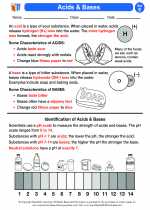 Acids and Bases
Acids and Bases  Worksheet/Answer key
Worksheet/Answer key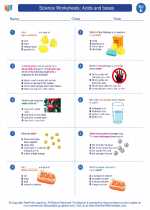 Acids and bases
Acids and bases  Worksheet/Answer key
Worksheet/Answer key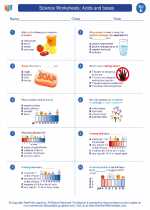 Acids and bases
Acids and bases  Worksheet/Answer key
Worksheet/Answer key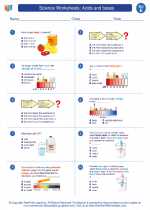 Acids and bases
Acids and bases  Worksheet/Answer key
Worksheet/Answer key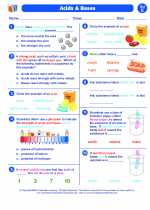 Acids and bases
Acids and bases  Vocabulary/Answer key
Vocabulary/Answer key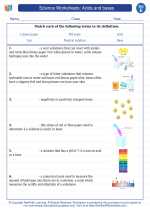 Acids and bases
Acids and bases  Vocabulary/Answer key
Vocabulary/Answer key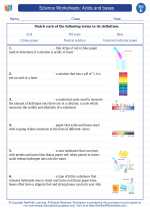 Science Worksheets: Acids and bases
Science Worksheets: Acids and bases 

 Activity Lesson
Activity Lesson
 Worksheet/Answer key
Worksheet/Answer key
 Worksheet/Answer key
Worksheet/Answer key
 Worksheet/Answer key
Worksheet/Answer key
 Worksheet/Answer key
Worksheet/Answer key
 Vocabulary/Answer key
Vocabulary/Answer key
 Vocabulary/Answer key
Vocabulary/Answer key

The resources above cover the following skills:
PHYSICAL SCIENCE
Matter and Its Interactions
Students who demonstrate understanding can:
Make observations and measurements to identify materials based on their properties.